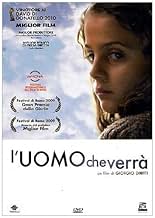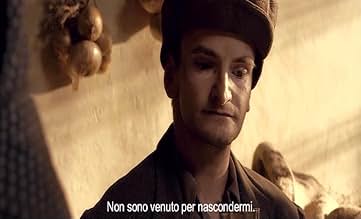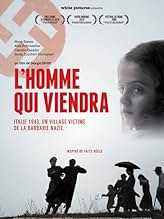IMDb RATING
7.4/10
1.9K
YOUR RATING
In the winter of 1943 a young girl named Martina stays silent following the death of her brother several years before. Her mother's pregnancy gives her hope, but as her brother is born the N... Read allIn the winter of 1943 a young girl named Martina stays silent following the death of her brother several years before. Her mother's pregnancy gives her hope, but as her brother is born the Nazis begin rounding up civilians.In the winter of 1943 a young girl named Martina stays silent following the death of her brother several years before. Her mother's pregnancy gives her hope, but as her brother is born the Nazis begin rounding up civilians.
- Director
- Writers
- Stars
- Awards
- 20 wins & 25 nominations total
Vito
- Signor Bugamelli
- (as Stefano 'Vito' Bicocchi)
- Director
- Writers
- All cast & crew
- Production, box office & more at IMDbPro
Featured reviews
Now this what i call an Underrated film, i don't why it didn't get the deserved attention, Maybe because of a poor Marketing i don't know but seriously this film need more appreciation, I highly Recommend it.
I just needed to write a direct answer to the review of "sfviewer123" - "Old wine new bottles" who voted 4.0 and claims about some stereotypization of the historical complexity.
Please disregard that review.
I can tell you that I grew up in the same region were the facts of this film are based, I read the historical documents, I watched the interviews of the survivals. My grandpa was hiding from the fascist forces in those years. This films captures to a true depth the reality of that conflict form the perspective of the innocent population. It is a unique gem in it's genre and it is historically very accurate of the events of the Marzabotto massacre.
I can tell you that I grew up in the same region were the facts of this film are based, I read the historical documents, I watched the interviews of the survivals. My grandpa was hiding from the fascist forces in those years. This films captures to a true depth the reality of that conflict form the perspective of the innocent population. It is a unique gem in it's genre and it is historically very accurate of the events of the Marzabotto massacre.
This movie is mostly seen through the eyes of the young girl, Martina, who along with the other children provides a depth of innocence which is the counterpoint to the ice-cold brutality of an invading army. The various viewpoints and behaviour of the diverse groups: villagers - old and young; partisans living in the woods;the clergy; the invading forces with their various levels of humanity from ruthless soldiers whose souls are dead to those who can't help but feel compassion for the people they are invading, never seem clichéd even though they may be in so many war movies. This is simply humanity at war, portrayed clearly and credibly without the slightest pretence. The cinematography, direction and acting are supremely natural, creating a fine, memorable movie.
I saw "L'uomo che verrà" in a small theater in Florence, Italy last February.
One of the beautiful things about the film is that it will appeal to various audiences in very different, albeit powerful ways. It was related to me that the historical events portrayed and implied by the film are quite accurate, so locals from the mountains above Bologna or history buffs won't feel disappointed by an inaccurate rendition. Depending on their demographic other Italians should either be able to sympathize or empathize with characters in the movie as well. For viewers that are not European, I can confidently say that they will find themselves presented with an old theme (Nazi occupation and brutality) delivered in a novel and unique theatrical vessel.
Additionally, the cinematography is wonderful. I truly did feel as if I was in the countryside with the characters of the movie being terrorized by a foreign occupying force.
As a side note, the movie is in a dialect that most Italians will not even understand. With the good subtitles, I felt that it actually added to the movie's appeal.
One of the beautiful things about the film is that it will appeal to various audiences in very different, albeit powerful ways. It was related to me that the historical events portrayed and implied by the film are quite accurate, so locals from the mountains above Bologna or history buffs won't feel disappointed by an inaccurate rendition. Depending on their demographic other Italians should either be able to sympathize or empathize with characters in the movie as well. For viewers that are not European, I can confidently say that they will find themselves presented with an old theme (Nazi occupation and brutality) delivered in a novel and unique theatrical vessel.
Additionally, the cinematography is wonderful. I truly did feel as if I was in the countryside with the characters of the movie being terrorized by a foreign occupying force.
As a side note, the movie is in a dialect that most Italians will not even understand. With the good subtitles, I felt that it actually added to the movie's appeal.
It's a bit of a challenge to take on and get across the full impact of the Marzabotto massacre, the worst war-time atrocity committed in Italy during WWII, and director Giorgio Diritti takes a bit of a risk in L'uomo che verrà (The Man who will Come) by viewing events from the perspective of an 8 year old girl. The approach however neither shies away from the very real horror of the events of September 1944 nor sentimentalises them, but presents the story in a shockingly realistic and matter-of-fact way.
Life in the Monte Sole region of Italy, in the mountains south of Bologna, is difficult enough for the inhabitants of the small farming community in the winter of 1943. The work is hard, the people live in poverty and are put under further strain by the taxes and regulations of the fascist government. The pact between Mussolini and Hitler however has just broken down and the German troops who patrol the region have suddenly become a more threatening presence.
For the first half of the film we only get a sense of this from the perspective of Martina, an 8 year old girl. Unaware of what is really going on, her view is one of an innocent gradually coming to an awareness of the nature of the world. No longer speaking since the death of her baby brother, Martina is a silent witness to the world around her, to the struggle to survive. Most of her experiences are typical of childhood; she's bullied at school, is gradually becoming aware of what goes on between men and women, and is looking forward to her mother giving birth to a new baby.
On the other hand, Martina also experiences horrors no child should ever be expected to witness. She sees German troops ambushed and prisoners being executed in the woods, hears the bombardment of Bologna, and experiences first-hand the events of the 28th and 29th September 1944 when she is rounded up with the other villagers by a Waffen SS unit. Accused of sheltering the Partisan units hiding out in the woods who have been attacking their patrols, the SS brutally execute around 770 citizens of Marzabotto; men, women and children alike.
This horrifying true-life event is filmed by director Giorgio Diritti without sentimentality and without exaggeration and it's all the more shocking for it. Despite the necessity of having to create a fictional family and present a child-like narrative viewpoint as a way to navigate through the events, L'uomo che verrà nonetheless is unmanipulative and has an authentic feel for the period, the poverty and the hardship experienced, sparing the viewer little of the horror of what really happened in the region in 1944. L'uomo che verrà won the Best Film award in Italy's 2010 David di Donatello awards.
Life in the Monte Sole region of Italy, in the mountains south of Bologna, is difficult enough for the inhabitants of the small farming community in the winter of 1943. The work is hard, the people live in poverty and are put under further strain by the taxes and regulations of the fascist government. The pact between Mussolini and Hitler however has just broken down and the German troops who patrol the region have suddenly become a more threatening presence.
For the first half of the film we only get a sense of this from the perspective of Martina, an 8 year old girl. Unaware of what is really going on, her view is one of an innocent gradually coming to an awareness of the nature of the world. No longer speaking since the death of her baby brother, Martina is a silent witness to the world around her, to the struggle to survive. Most of her experiences are typical of childhood; she's bullied at school, is gradually becoming aware of what goes on between men and women, and is looking forward to her mother giving birth to a new baby.
On the other hand, Martina also experiences horrors no child should ever be expected to witness. She sees German troops ambushed and prisoners being executed in the woods, hears the bombardment of Bologna, and experiences first-hand the events of the 28th and 29th September 1944 when she is rounded up with the other villagers by a Waffen SS unit. Accused of sheltering the Partisan units hiding out in the woods who have been attacking their patrols, the SS brutally execute around 770 citizens of Marzabotto; men, women and children alike.
This horrifying true-life event is filmed by director Giorgio Diritti without sentimentality and without exaggeration and it's all the more shocking for it. Despite the necessity of having to create a fictional family and present a child-like narrative viewpoint as a way to navigate through the events, L'uomo che verrà nonetheless is unmanipulative and has an authentic feel for the period, the poverty and the hardship experienced, sparing the viewer little of the horror of what really happened in the region in 1944. L'uomo che verrà won the Best Film award in Italy's 2010 David di Donatello awards.
Did you know
- GoofsThere is a scene of partisans walking through the snow at around 26:30. There are four shots in total, with three shots (1st, 2nd and 4th) showing seven partisans, and the other (3third shot showing nine partisans.
- How long is The Man Who Will Come?Powered by Alexa
Details
- Release date
- Country of origin
- Official sites
- Languages
- Also known as
- L'uomo che verrà
- Filming locations
- Castel San Pietro Terme, Bologna, Emilia-Romagna, Italy(exterior scenes)
- Production companies
- See more company credits at IMDbPro
Box office
- Budget
- €3,000,000 (estimated)
- Gross worldwide
- $3,034,481
- Runtime
- 1h 55m(115 min)
- Color
- Aspect ratio
- 2.35 : 1
Contribute to this page
Suggest an edit or add missing content





























